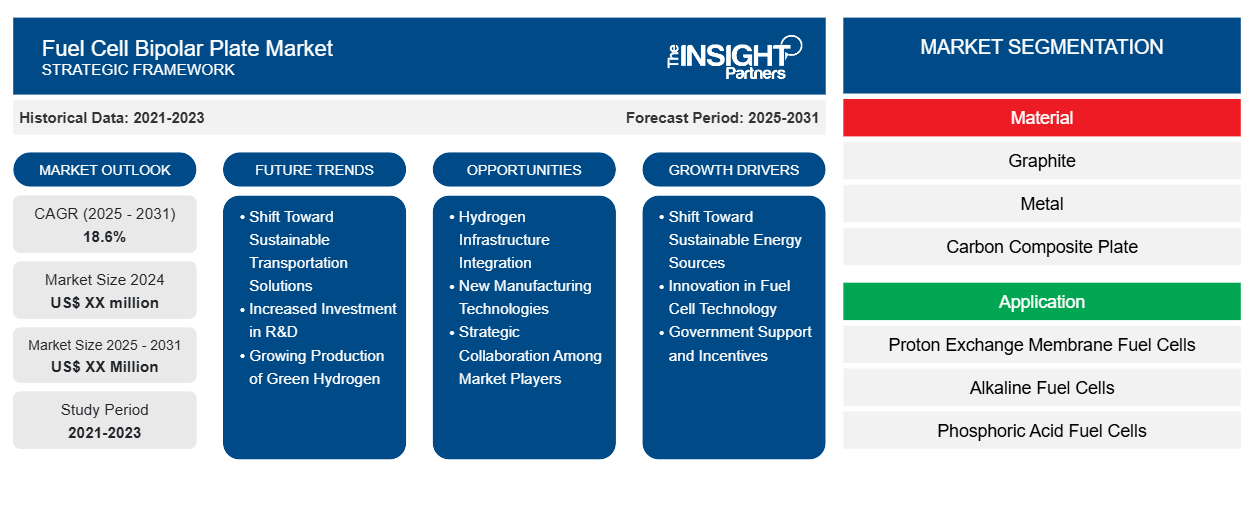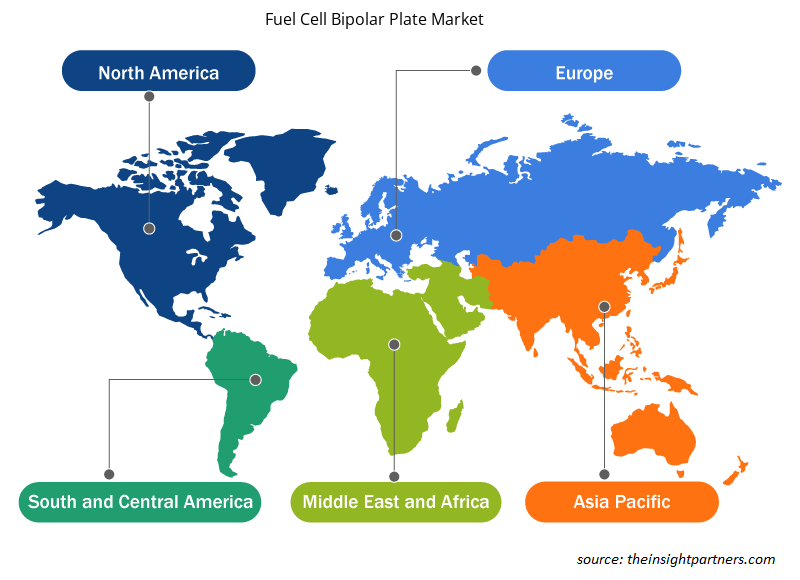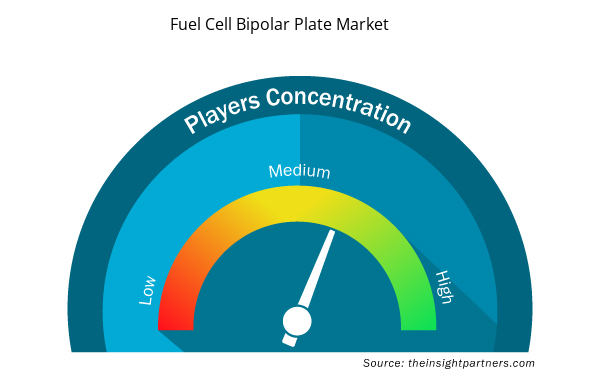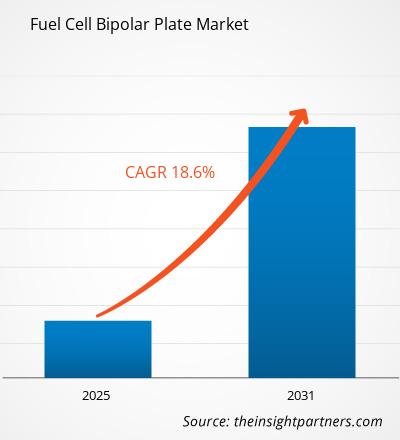The Fuel Cell Bipolar Plate Market is expected to register a CAGR of 18.6% from 2025 to 2031, with a market size expanding from US$ XX million in 2024 to US$ XX Million by 2031.
The Fuel Cell Bipolar Plate Market report covers analysis By Material and Applications. The market report offers a segmental analysis based on the geographical growth regions.
Purpose of the Report
The report Fuel Cell Bipolar Plate Market by The Insight Partners aims to describe the present landscape and future growth, top driving factors, challenges, and opportunities. This will provide insights to various business stakeholders, such as:
- Technology Providers/Manufacturers: To understand the evolving market dynamics and know the potential growth opportunities, enabling them to make informed strategic decisions.
- Investors: To conduct a comprehensive trend analysis regarding the market growth rate, market financial projections, and opportunities that exist across the value chain.
- Regulatory bodies: To regulate policies and police activities in the market with the aim of minimizing abuse, preserving investor trust and confidence, and upholding the integrity and stability of the market.
Fuel Cell Bipolar Plate Market Segmentation
Material
- Graphite
- Metal
- Carbon Composite Plate
Application
- Proton Exchange Membrane Fuel Cells
- Alkaline Fuel Cells
- Phosphoric Acid Fuel Cells
- Molten Carbonate Fuel Cells
- Solid Oxide Fuel Cells
- Direct Methanol Fuel Cells
Customize This Report To Suit Your Requirement
You will get customization on any report - free of charge - including parts of this report, or country-level analysis, Excel Data pack, as well as avail great offers and discounts for start-ups & universities
Fuel Cell Bipolar Plate Market: Strategic Insights

- Get Top Key Market Trends of this report.This FREE sample will include data analysis, ranging from market trends to estimates and forecasts.
Fuel Cell Bipolar Plate Market Growth Drivers
- Shift Toward Sustainable Energy Sources: A big driver in the Fuel Cell Bipolar Plate Market is the shift toward sustainable energy sources. The increased intensity of campaigns around the world to reduce carbon emissions finds fuel cells fitting at the right time as an alternate and clean source of power generation instead of conventionally degrading power from fossil fuels and other fossil-based products. The International Energy Agency has forecasted hydrogen demand to grow 50% by 2030. These increases will significantly open up for opportunities in the Fuel Cell Bipolar Plate Market, thereby highly influencing the market size and share as manufacturers bolster product offerings to meet rising demands.
- Innovation in Fuel Cell Technology: Innovation in fuel cell technology also acts as an important driver for the growth of the Fuel Cell Bipolar Plate Market. High-performance advanced materials as well as best manufacturing techniques have increased the efficiency and durability levels of bipolar plates, thus having a positive influence on market share for firms using advanced technologies to meet emerging needs of customers.
- Government Support and Incentives: Governments are providing grants, subsidies, and tax incentives to fuel cell technology, as well as policies that continuously support renewable energy along with constant policies that reduce fossil fuels dependence, are pushing this market ahead. In 2021, the US Department of Energy committed more than $100 million to hydrogen and fuel cell technologies. Such programs open vast opportunities for the stakeholders in the Fuel Cell Bipolar Plate Market, hence allowing its overall growth and making new investments.
Fuel Cell Bipolar Plate Market Future Trends
- Shift Toward Sustainable Transportation Solutions: Trends in the Fuel Cell Bipolar Plate Market are heavily influenced by a shift toward sustainable transportation solutions. Governments across the world are investing in hydrogen fuel cell technologies with the aim of lowering emission levels in public transport and heavy-duty vehicles. Following this, the scope of the Fuel Cell Bipolar Plate Market is expanding with automakers adopting FCVs, and the demand has particularly surged in the North American fuel Cell Bipolar Plate Market with an increased commitment to green energy solutions.
- Increased Investment in R&D: Increased investment in research and development also enhances the Fuel Cell Bipolar Plate Market. In other words, companies and governments often increase their investment in R&D to optimize the technologies of fuel cells and enhance the efficiency of bipolar plates. This trend is fueled by the requirement of the need for low-cost solutions with better performance metrics expected to exceed $10 billion by 2026 globally. Innovation in the Fuel Cell Bipolar Plate Market will bring applications towards durability and conductivity in the years ahead to boost North America's Fuel Cell Bipolar Plate Market growth.
- Growing Production of Green Hydrogen: The growing production methods of green hydrogen are highly influencing the Fuel Cell Bipolar Plate Market. As green hydrogen is considered an alternative that can replace fossil fuels for achieving industrial sustainability, the approach has gained acceptance amongst industries increasingly. This shift, in turn, is boosting the outlook of the Fuel Cell Bipolar Plate Market, primarily in power generation and industrial applications. Forecasts indicate that the demand for fuel cells using green hydrogen could raise market value by over 30% in the next five years, specifically to the North America Fuel Cell Bipolar Plate Market.
Fuel Cell Bipolar Plate Market Opportunities
- Hydrogen Infrastructure Integration: With the development of hydrogen as a primary energy carrier, fuel cell integration in the hydrogen infrastructure presents a significant opportunity that mainly Global Fuel Cell Bipolar Plate Market players will enjoy as the hydrogen supply chain expands. According to projections, the hydrogen market is expected to surpass $2.5 trillion by 2050. Thus, the key to maximizing this new market will be a niche determined by hydrogen production, storage, and distribution, all of which will consequently create added value for overall bipolar plate market growth.
- New Manufacturing Technologies: The new manufacturing technologies, such as 3D printing and automated production, hold vast growth opportunities for the Fuel Cell Bipolar Plate Market. These can lead to cost-effective production and scalable bipolar plate manufacturing. Thus, the adoption of these strategies in the Fuel Cell Bipolar Plate Market could help to expand operational efficiency and market penetration much more.
- Strategic Collaboration Among Market Players: In the recent past, the importance of strategic collaboration among major market players has been on an upward trajectory in the Fuel Cell Bipolar Plate Market. Collaboration among automotive makers, energy companies, and research institutes improves the rate of technology development and commercialization of fuel cells. This can, therefore, lead to innovation as well as enhance the knowledge exchange among vendors, making it exciting overall in the technology landscape for the Fuel Cell Bipolar Plate Market. According to some reports, collaboration is believed to boost market growth due to the creation of synergies that can improve the production rate and performance.
Fuel Cell Bipolar Plate Market Regional Insights
The regional trends and factors influencing the Fuel Cell Bipolar Plate Market throughout the forecast period have been thoroughly explained by the analysts at Insight Partners. This section also discusses Fuel Cell Bipolar Plate Market segments and geography across North America, Europe, Asia Pacific, Middle East and Africa, and South and Central America.

- Get the Regional Specific Data for Fuel Cell Bipolar Plate Market
Fuel Cell Bipolar Plate Market Report Scope
| Report Attribute | Details |
|---|---|
| Market size in 2024 | US$ XX million |
| Market Size by 2031 | US$ XX Million |
| Global CAGR (2025 - 2031) | 18.6% |
| Historical Data | 2021-2023 |
| Forecast period | 2025-2031 |
| Segments Covered |
By Material
|
| Regions and Countries Covered | North America
|
| Market leaders and key company profiles |
Fuel Cell Bipolar Plate Market Players Density: Understanding Its Impact on Business Dynamics
The Fuel Cell Bipolar Plate Market market is growing rapidly, driven by increasing end-user demand due to factors such as evolving consumer preferences, technological advancements, and greater awareness of the product's benefits. As demand rises, businesses are expanding their offerings, innovating to meet consumer needs, and capitalizing on emerging trends, which further fuels market growth.
Market players density refers to the distribution of firms or companies operating within a particular market or industry. It indicates how many competitors (market players) are present in a given market space relative to its size or total market value.
Major Companies operating in the Fuel Cell Bipolar Plate Market are:
- Ballard Power Systems Inc.
- Cell Impact
- Dana Incorporated
- Interplex Holdings Pte. Ltd.
- Nisshinbo Chemical Inc.
Disclaimer: The companies listed above are not ranked in any particular order.

- Get the Fuel Cell Bipolar Plate Market top key players overview
Key Selling Points
- Comprehensive Coverage: The report comprehensively covers the analysis of products, services, types, and end users of the Fuel Cell Bipolar Plate Market, providing a holistic landscape.
- Expert Analysis: The report is compiled based on the in-depth understanding of industry experts and analysts.
- Up-to-date Information: The report assures business relevance due to its coverage of recent information and data trends.
- Customization Options: This report can be customized to cater to specific client requirements and suit the business strategies aptly.
The research report on the Fuel Cell Bipolar Plate Market can, therefore, help spearhead the trail of decoding and understanding the industry scenario and growth prospects. Although there can be a few valid concerns, the overall benefits of this report tend to outweigh the disadvantages.
- Historical Analysis (2 Years), Base Year, Forecast (7 Years) with CAGR
- PEST and SWOT Analysis
- Market Size Value / Volume - Global, Regional, Country
- Industry and Competitive Landscape
- Excel Dataset


- Mice Model Market
- Intraoperative Neuromonitoring Market
- Broth Market
- Vertical Farming Crops Market
- Airline Ancillary Services Market
- Artificial Intelligence in Healthcare Diagnosis Market
- Constipation Treatment Market
- Dealer Management System Market
- Pharmacovigilance and Drug Safety Software Market
- GMP Cytokines Market

Report Coverage
Revenue forecast, Company Analysis, Industry landscape, Growth factors, and Trends

Segment Covered
This text is related
to segments covered.

Regional Scope
North America, Europe, Asia Pacific, Middle East & Africa, South & Central America

Country Scope
This text is related
to country scope.
Frequently Asked Questions
Some of the customization options available based on request are additional 3-5 company profiles and country-specific analysis of 3-5 countries of your choice. Customizations are to be requested/discussed before making final order confirmation, as our team would review the same and check the feasibility.
The report can be delivered in PDF/PPT format; we can also share excel dataset based on the request.
Key companies in this market are: Ballard Power Systems Inc, Cell Impact, Dana Incorporated, Interplex Holdings Pte Ltd, Nisshinbo Chemical Inc, PRAGMA INDUSTRIES, Schunk Carbon Technology, Shanghai Hongfeng Industrial Co Ltd, TECHNICAL FIBRE PRODUCTS
The Fuel Cell Bipolar Plate Market is expected to register a CAGR of 18.6% from 2023-2031.
Key future trends in this market are - Rise in renewable energy adoption, Increased demand for clean energy solutions, Advanced material innovations
The major factors impacting the Fuel Cell Bipolar Plate Market are: Government Initiatives and Incentives, Technological Advancements, and Increasing Demand for Clean Energy
Trends and growth analysis reports related to Energy and Power : READ MORE..
1. Ballard Power Systems Inc.
2. Cell Impact
3. Dana Incorporated
4. Interplex Holdings Pte. Ltd.
5. Nisshinbo Chemical Inc.
6. PRAGMA INDUSTRIES
7. Schunk Carbon Technology
8. Shanghai Hongfeng Industrial Co.,Ltd.
9. TECHNICAL FIBRE PRODUCTS
10. Veco B.V.

 Get Free Sample For
Get Free Sample For